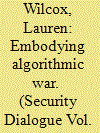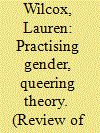|
|
|
Sort Order |
|
|
|
Items / Page
|
|
|
|
|
|
|
| Srl | Item |
| 1 |
ID:
151189


|
|
|
|
|
| Summary/Abstract |
Through a discussion of drone warfare, and in particular the massacre of 23 people in the Uruzgan province in Afghanistan in 2010, I argue that drone warfare is both embodied and embodying. Drawing from posthuman feminist theorists such as Donna Haraway and N Katherine Hayles, I understand the turn toward data and machine intelligence not as an other-than-human process of decisionmaking that deprives humans of sovereignty, but as a form of embodiment that reworks and undermines essentialist notions of culture and nature, biology and technology. Through the intermediation of algorithmic, visual, and affective modes of embodiment, drone warfare reproduces gendered and racialized bodies that enable a necropolitics of massacre. Finally, the category of gender demonstrates a flaw in the supposed perfectibility of the algorithm in removing issues of identity or prejudice from security practices, as well as the perceptions of drone assemblages as comprising sublime technologies of perfect analysis and vision. Gender as both a mode of embodiment and a category of analysis is not removed by algorithmic war, but rather is put into the service of the violence it enables.
|
|
|
|
|
|
|
|
|
|
|
|
|
|
|
|
| 2 |
ID:
088709


|
|
|
|
|
| Publication |
2009.
|
| Summary/Abstract |
Theorists of the offense-defense balance frequently note that perceptions of technology, as well as military doctrine, play a role in states' perception of offense dominance or the "cult of the offensive." I argue that gender may constitute the missing link in explaining this misperception and suggest three possible areas of investigation. First, the perceptions and uses of technologies are dependent upon gendered ideologies which encouraged disastrous strategies in the First World War. Second, gender is an integral part of nationalism that promotes offensive policies by defining masculinity in terms of heroic service to the nation. Third, gendered discourses of protection use the language of defense to legitimate offensive policies. By analyzing the roots of perceptions of offense dominance, feminist analysis shows how gender discourses and the production of gender identities are not confined to individuals and the private realm but rather are a pervasive fact of social life on an international scale.
|
|
|
|
|
|
|
|
|
|
|
|
|
|
|
|
| 3 |
ID:
191618


|
|
|
|
|
| Summary/Abstract |
Patricia Owens and Katharina Rietzler’s Women’s International Thought: A New History is a rare edited collection that is more than the sum of its parts. The work not only recovers missing and erased forms of ‘international thought’ that had been neglected in the institutionalisation of International Relations (IR) as a discipline in the interwar years to the mid twentieth century, but itself works to imagine and practice an ‘IR otherwise’. The title is somewhat of an uneasy fit for the volume because of the ways the figures discussed challenge the boundaries and definitions of all three categories: women, international, and thought.
|
|
|
|
|
|
|
|
|
|
|
|
|
|
|
|
| 4 |
ID:
153667


|
|
|
|
|
| Summary/Abstract |
The zombie, as a Western pop culture icon, has taken up residence in International Relations. Used both humorously and as a serious teaching tool, many scholars and professors of IR have written of the zombie as a useful figure for teaching IR theory in an engaging manner, and have used zombie outbreaks to analyse the responses of the international community during catastrophe, invasion, and natural disasters. The authors of this article would like to unearth another aspect of the zombie that is often left unsaid or forgotten: namely, that the body of the zombie, as a historical phenomenon and cultural icon, is deeply imbricated in the racialisation of political subjects and fear of the Other. Through a critical analysis of biopower and race, and in particular Weheliye’s concept of habeas viscus, we suggest that the figure of the zombie can be read as a racialised figure that can provide the means for rethinking the relationship of the discipline of IR to the concept of race. We read The Walking Dead as a zombie narrative that could provide a critical basis for rethinking the concepts of bare life and the exception to consider ‘living on’ in apocalyptic times.
|
|
|
|
|
|
|
|
|
|
|
|
|
|
|
|
| 5 |
ID:
157604


|
|
|
|
|
| Summary/Abstract |
The development of a ‘practice turn’ in International Relations promises to reconstitute IR theory around the study of embodied practices. Despite occasional references to Judith Butler’s work, the contributions of feminist and queer theory are under recognised in existing work. In this piece I note the distinctive approach to gender as a practice represented by Butler and other feminist/queer theorists for its emphasis on intelligibility and failure, particularly the importance on ‘competently’ practising gender in order to established as an intelligible subject. Given the centrality of ‘competency’ in ‘practice turn’ literature, theorising practice from the perspective of ‘gender failures’ sheds light on the embedded exclusions within this literature. To demonstrate the stakes of this critique, I discuss airport security practices, a growing area of interest to IR scholars, in terms of the experiences of trans- and gender non-conforming people. I argue that such practices ultimately complicate success/failure binaries. I conclude by considering the political stakes of practising theory in IR and how competency in theory is similarly marked by the exclusion of feminist/queer work.
|
|
|
|
|
|
|
|
|
|
|
|
|
|
|
|
|
|
|
|
|